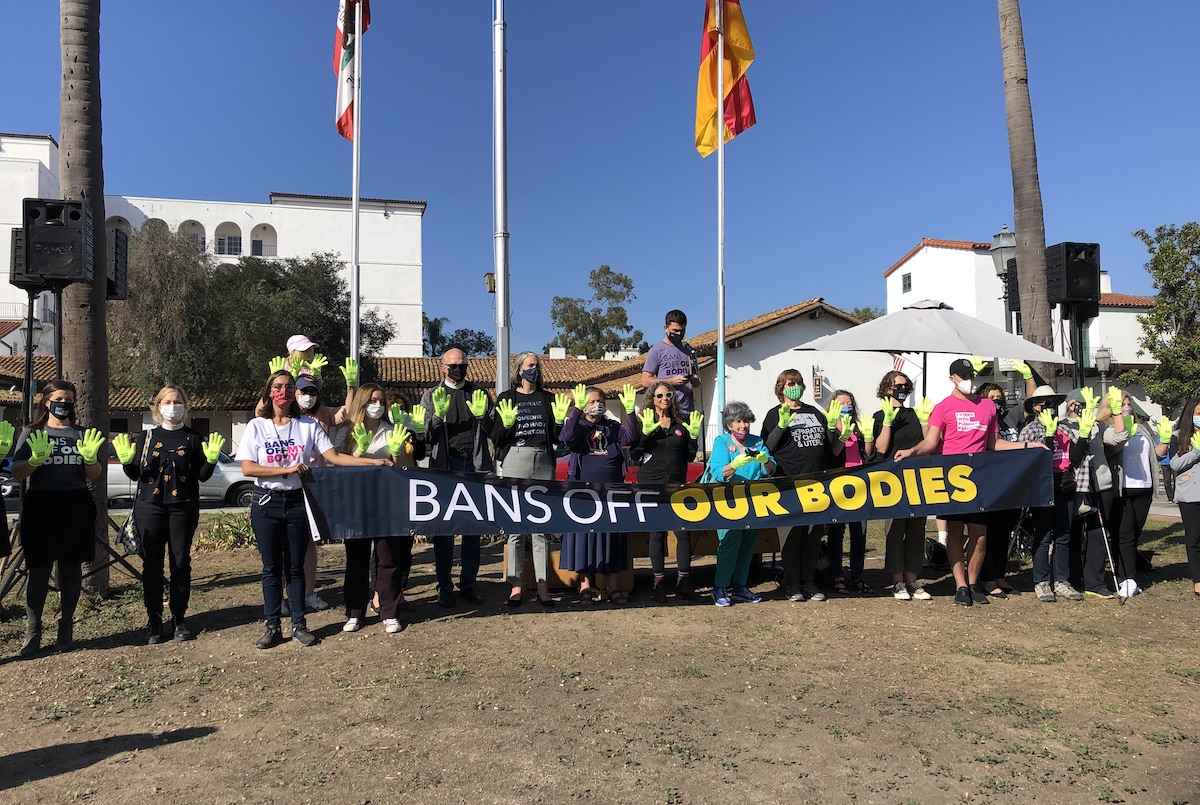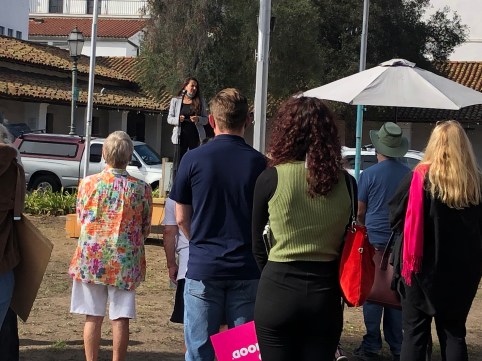Planned Parenthood Holds Upbeat Rally for ‘Roe v. Wade’ in Santa Barbara
Grim Tone from Supreme Court During Wednesday Morning's Hearing

The six-to-three conservative majority on the Supreme Court was years in the making, Planned Parenthood’s Jenna Tosh told about 100 Santa Barbarans gathered on Wednesday to rally in De la Guerra Plaza in support of Roe v. Wade, as have the conservative voting districts and politicians who put them there.
It all came to a head this morning when the country’s highest court heard a Mississippi case that puts a limit on abortions at 15 weeks. From the tenor of the questions asked and the thinking behind them, many believe the justices are leaning toward a ban that would overturn Roe rather than a narrower ruling over the time limit on abortions. Their written opinion is likely to come out in June or July, which traditionally is when the court’s most important rulings are made public.

In this case, such a ruling would be groundbreaking, speakers at the rally said. Santa Barbara Mayor Cathy Murillo remembered how earlier generations had no safe recourse for an unwanted pregnancy. “We heard horror stories,” she recalled, until the passage of Roe v. Wade and a recognition that “women’s rights are human rights.” Now, a generation of women have never known a time when these rights were absent, until now.
The possibility that Roe could be overturned has been a constant question at congressional hearings for Supreme Court nominees. Critically, Maine Senator Susan Collins’s vote for Brett Kavanaugh was in part based on his statement that he considered Roe v. Wade to be settled law.
However, this Wednesday, the justices discussed the necessity of abandoning precedent, as in the Brown v. Board of Education case, which outlawed “separate but equal” education, and Miranda v. Arizona, which required police to advise criminal suspects of their rights. A discussion reported in the Washington Post has Kavanaugh asking if a precedent were seriously wrong, wasn’t the solution “to return to the position of neutrality?” Julie Rikelman, an attorney with Center for Reproductive Rights and representing the defendant, stated Roe had 50 years of precedent and Mississippi had proffered no “special justification” as required to change a long-standing law.
Sign up for Indy Today to receive fresh news from Independent.com, in your inbox, every morning.
Despite the disturbing news, Wednesday afternoon’s rally in De la Guerra Plaza was an upbeat event that looked to the future. More than 20 states had laws on their books ready to let loose when the decision comes down, said Luz Reyes-Martín, vice president with the local Planned Parenthood. It would affect health care for thousands of miles around for millions of women, she said. To prepare, four states, including California, were gearing up to become “a beacon of care” for women’s reproductive health. In so doing, the states were likely to become a target of political actions to remove pro-choice politicians, she said.
Unitarian minister Julia Hamilton offered a benediction for lifesaving medical providers and their supporters who keep abortion legal, safe, and available to everyone. Saying she spoke for clerics of many faiths, “To those who are against abortion out of religious belief, do not impose your theology of shame on my body,” Hamilton declared. “I will fight with a song of liberation and grace, and I know I’m not singing alone.”
“We say no to bans on our bodies!” State Senator Monique Limón told the small crowd forcefully, recounting how friends had been texting her this morning, expressing fear and disbelief this was really happening. “There are 36 million women now in this country saying ‘save our rights,'” she said, the number of women who would be affected if the 26 states were able to impose a 15-week abortion ban.
The Women’s Health Protection Act has passed the House already, Limón noted, which was a glimmer of hope. “It’s time to ask the Senate to pass the law!” she asserted, saying to cheers from the crowd that Santa Barbara Congressmember Salud Carbajal had voted for it and had been at the Supreme Court this morning.
In a video posted at his Facebook page, Carbajal says from the rally in D.C.: “What’s so significant is that this could undermine the laws of the land, which is Roe versus Wade,” adding that congressmembers had walked to the court to remind the justices of the seriousness of the stakes. “It’s important that the Supreme Court hear us loud and clear, to not take us back but rather take us forward.”
Support the Santa Barbara Independent through a long-term or a single contribution.




You must be logged in to post a comment.